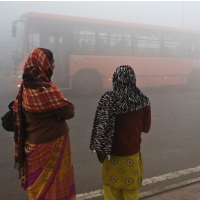Air Pollution Halves India’s Grain Production
 Heavy smog envelopes Delhi each winter (file photo: AFP)
Heavy smog envelopes Delhi each winter (file photo: AFP)
Air pollution seems to have a direct, negative impact on grain production in India, a study has warned, with projected yields falling by half due to recent increases in smog. According to The Guardian, the finding has implications for global food security as India is a major rice exporter.
Analysing 30 years of data, scientists have developed a statistical model suggesting that air pollution caused wheat yields in densely populated states to be 50 percent lower than what they could have been in 2010.
According to Reuters, the study found that up to 90 percent of the decrease in potential food production was linked to smog, made up of black carbon and other pollutants. The remaining 10 percent was due to global warming and changes in precipitation levels.
Black carbon is mostly caused by rural cooking stoves and reduces the amount of sunlight plants receive. Ozone damaging their leaves and forms as a result of motor vehicle exhausts, industrial emissions, and chemical solvents reacting in the atmosphere in the presence of sunlight.
Both are “short-lived climate pollutants” that exist locally in the atmosphere for weeks to months, compared to greenhouse gases like carbon dioxide and nitrous oxide that can persist for decades to centuries. This means that addressing sources of the short-lived pollutants will have more immediately perceptible effects.
"We hope our study puts the potential benefits on cleaning up the air on the table," Jennifer Burney, co-author of the study and environmental scientist at the University of California, San Diego, told the Thomson Reuters Foundation.
She pointed out that agricultural impact is often not considered when governments debate the economic costs of air pollution and new legislation to combat it.
The research paper ‘Recent climate and air pollution impacts on Indian agriculture’, was published in the Proceedings of National Academy of Sciences. It analysed the potential level of wheat production if there was less pollution.
Scientists examined historical data on crop yields, emissions, and precipitation to draw their conclusions. The historical research generally confirms what chemists and other scientists have said in past studies about the impact of air pollution on food production.
While tackling global warming requires international action and may take decades, reducing smog is often a simpler process that can be implemented by the government immediately.
"The technologies to fix this problem exist," Burney said. These include using cleaner coal, fitting trucks with better particulate filters for diesel, and encouraging rural residents to use cleaner fuels in their cooking stoves, rather than biomass.
"None of these (mitigation techniques) are very high tech," she said, adding that better public policies on clean air could help India meet its goal of reducing hunger to zero.
Food production in India continues to increase because of new technologies and management techniques. But it is increasingly clear that these gains could be even higher if efforts to combat smog are taken at the local and state levels.
- Karan Singh
To Learn More:
India air pollution 'cutting crop yields by almost half' (by Azeen ghorayshi, The Guardian)
Air pollution slashes India's potential grain yields by half – study (by Chris Arsenault, Reuters)
Recent climate and air pollution impacts on Indian agriculture (by Jennifer Burney and V Ramanathan)
- Top Stories
- Controversies
- Where is the Money Going?
- India and the World
- Appointments and Resignations
- Unusual News
- Latest News
- India College Chain’s Expansion into U.S. Draws Opposition from Massachusetts Officials over Quality of Education
- Milk Shortages in India Tied to Release of New Movies Featuring Nation’s Favorite Stars
- Confusion Swirls around Kashmir Newspaper Ban in Wake of Violent Street Protests
- Polio-Free for 5 Years, India Launches Vaccine Drive after Polio Strain Discovery
- New Aviation Policy Could Increase Service, Lower Ticket Prices






Comments